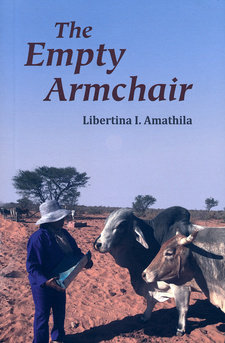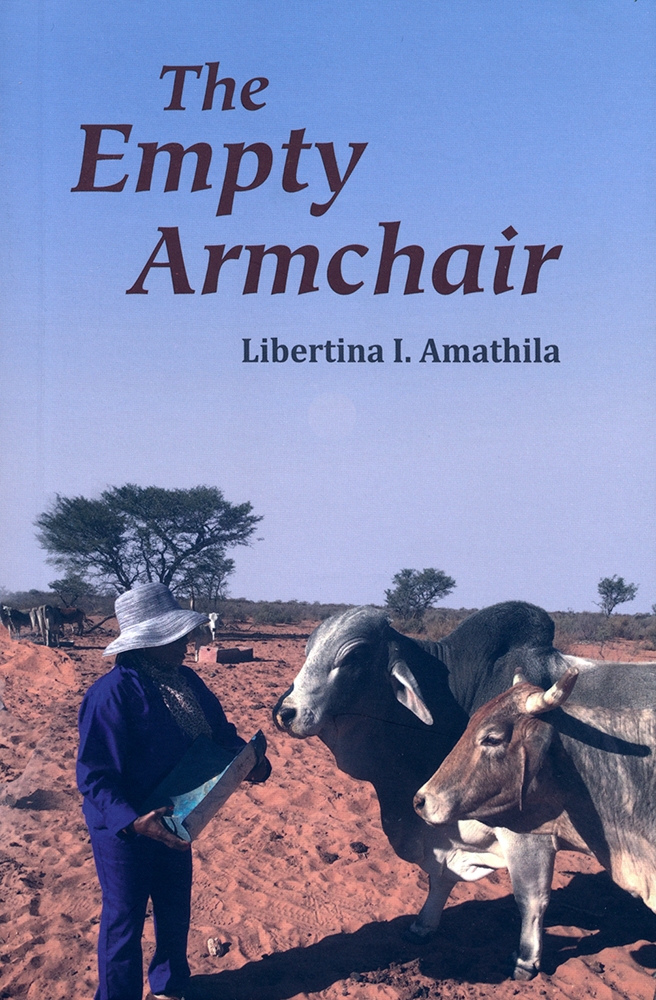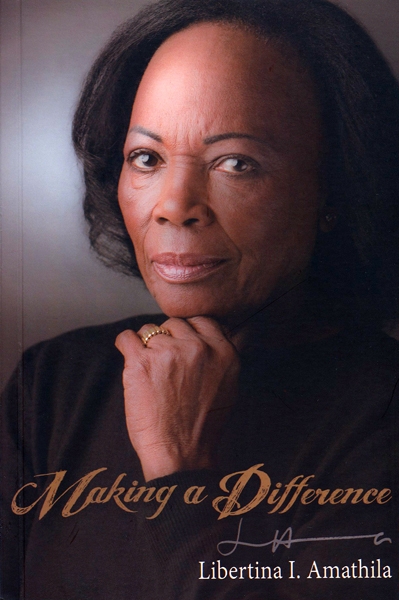The Empty Armchair, by Libertina Inaaviposa Amathila

The Empty Armchair, by Libertina Inaaviposa Amathila. Self-published. Nuwe Rus, Namibia 2019. ISBN 9789994589401 / ISBN 978-9-99-458940-1
The Empty Armchair: how life changes for a Namibian Big Shot after retirement as newbe farmer and how - alike white farmers - black farmers have to put aside illusions and come to accept reality facts of commercial farming. This are highly interesting news from Libertina Inaaviposa Amathila, farmer on New Rus.
Farm Workers in Namibia
Farmers depend on farm workers, and without them a farm obviously cannot survive. So, farmers play an important role in creating jobs. Many people live on farms and that's the place they call home, where their parents may have worked and where some were born. According to the Namibia Statistics Agency (NSA) there were 12,380 privately owned commercial farms in 2018. If each farm has three to four workers, with the bigger farms employing more, it's clear that very many people are employed on the farms. Then there are the communal farmers who mainly employ family members and a few other workers, who also earn salaries. The NSA states that 167,242 people were employed in the Agriculture, Forestry and Fishing sector in 2018, some 23 per cent of the country's total workforce. I've learned a lot through employing different farm workers, including those whose culture and behaviour is new to me, who come from different regions, homes, and have a background and upbringing different from mine. I've had to find ways to create understanding and learn how to treat my farm workers. They too have had to learn about my expectations and how to treat me. Many Namibians have paternalistic and patriarchal attitudes. Traditional attitudes often dictate a woman's place in society, which is thought to be taking care of the family as obedient servants of their fathers, husbands and male family members. They're expected to stay in the kitchen, not to own and run farms. Indeed, most farm owners are men. So my workers had the additional challenge of learning how to deal with their new boss who is a woman and on top of that was someone known to them as a Government Minister. One day, some friends of mine came with a cow to donate to my new farm. They came with one of their farm workers who discreetly looked around for the farm owner. Not seeing a man, he enquired from my farm workers where the owner of the farm was. When he was told that I was the farm owner, he commented on the fact that the farm was well kept from what he had seen so far, and said 'So a woman can also run a farm?' Indeed, we can! After Independence we repealed the laws that had treated women as minors, and women started to own farms, although they are still a small minority. Many farm workers have little education and live at the margins of society. However, some of the older ones have worked on farms all their lives and if you employ members of that older generation, you are lucky because they know the work. They will teach you how to look after your livestock because they have vast experience, and they are loyal and committed workers. I've been told by a lot of white farmers that they have workers who have worked for them for 10 or 20 years, and these workers were inherited from their parents who passed on and left the farm and workers for them. Of course, the older generation of workers who know farm work and farm life are now getting too old to work. In my experience, the younger generation has little appetite for farm work. Some younger farm workers know their rights but not their responsibilities. Others want to make a quick buck and disappear. When I hear of the unemployment rate amongst the youth, I wonder why they don't create teams to work on farms, particularly de-bushing or fencing, which are widely needed. The younger workers usually need training about farm work. [...]
This is an excerpt from The Empty Armchair, by Libertina Inaaviposa Amathila.
Title: The Empty Armchair
Author: Libertina Inaaviposa Amathila
Publisher: Libertina Inaaviposa Amathila
Nuwe Rus, Namibia 2019
ISBN 9789994589401 / ISBN 978-9-99-458940-1
Softcover, 14 x 21 cm, 110 pages, several colour photographs and tables
Amathila, Libertina Inaaviposa im Namibiana-Buchangebot
The Empty Armchair
The Empty Armchair is a sequel to Dr. Libertina Inaaviposa Amathila’s autobiography Making a Difference.
Making a Difference
Making a Difference is the life story of Libertina Inaaviposa Amathila former minister in Namibia.


